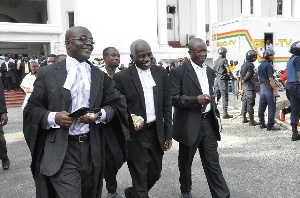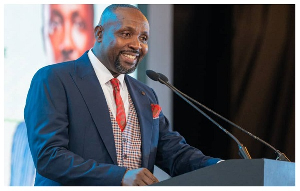On Tuesday 26 January, that is Day 28 counting from when former President John Mahama filed his election petition at the Supreme Court, which also marked Day 3 of the hearing, the seven-member panel openly chided the petitioner for failing to comply with the court’s earlier orders asking him to file his witness statements.
When the court sat at exactly 9.30 am, Tsatsu Tsikata, the Lead Counsel for the petitioner was not present as expected.
Tony Lithur, who is his assistant stood up to introduce himself, followed by Justin Amenuvor with Somuah Asamoah for the First Respondent; and Akoto Ampaw with Frank Davies, Kwaku Asirifi and Yaw Oppong for 2nd Respondent.
Samuel Ofosu-Ampofo, the NDC National Chairman represented the Petitioner; Jean Mensa, Chairperson of the Electoral Commission (EC) represented her institution named as the 1st Respondent, whilst Peter Mac Manu, the 2020 NPP Campaign Manager represented Nana Akufo-Addo, the second Respondent.
Before the hearing could start, however, Tony Lithur, who had defended Mahama in the 2012-2013 election petition and was thus equally able and capable, pleaded with the court for a halt to the day’s proceedings until the arrival of Tsatsu Tsikata.
The justices did not take kindly to that, stating that the official time for the hearing was 9.30 am.
The justices further indicated that Lithur’s law firm, Lithur Brew & Company, had been filing all the processes at the court with his signature on the filed documents, hence he was competent to deal with the matter at hand.
The justices, thus denying him that request, then proceeded to bombard Lithur with a series of questions bordering on why their team failed to obey the court’s orders.
The court had on 19 January ordered that witness statements be filed and written responses from the Respondents, if any, filed, and the next hearing fixed for 26 January - their lordships thereby jettisoning the case management process they had earlier promised.
The petitioner through his counsels then filed “a stay” of the entire process, averring that if his application for review on [a] motion to file interrogatories on the EC is granted, his witness statements will change, thereby occasioning injustice to him.
After Tony Lithur had taken the heat from the bench, the CJ asked when the stay was filed, whereupon Lithur replied, “20 January”.
The justices then went on recess to attend to the application for stay of proceedings.
When the court resumed around 10: 23 am, the President of the Court, Kwasi Anin Yeboah ruled thus:
“The business of conducting this petition will be done in an orderly and expeditious manner and as procedurally directed by C.I. 99. It is clear that whatever issue that may arise from the interrogatories filed by the petitioner can be incorporated in the due conduct of the trial.
“We do not appreciate the fact that the current processes filed should make room for the petitioners to [ignore] the prior orders of the court to the extent that the earlier order has not been complied with.
“The petitioner is referred to the following rules of the court: Rule 69 C4b of the Supreme Court rule as amended by C.I. 99 which reads that the court may dismiss the petition when the petitioner fails to file the processes directed within the specified time.
“The court will determine the petition when the respondents fail to file their answers or the processes regarding their answer within the specified time,” the Chief Justice said.
The petitioner was thus cautioned and asked to submit his witness statement by close of business on Wednesday.
The court adjourned sitting to Thursday, January 28. Tsatsu Tsikata, who was then present [during this ruling], expressed his profound gratitude to the court.
Below is the interaction between the justices of the Supreme Court and Tony Lithur as culled from myjoyonline by GhanaWeb and edited for grammar:
Bench: Your understanding of the stay of proceedings is that you don’t file processes ordered by the court?
Tony Lithur: Our application is intended to stay or hold proceedings.
Bench: You say stay means not to file processes but even yesterday, you filed processes so you choose and pick what to file. Let me understand you, by filing a stay are you saying you need not file the witness statements and the written submission?
Bench: You filed the petition, you came to this court and submitted your cause of action and reliefs. You said you had five witnesses and we ordered all counsel[s] to file their witness statements, why have you not filed?
Tony Lithur in all these sought to impress on the court that the determination of their review related to the issues and the witness statements, hence their decision not to file but rather file the stay. Bench: Are you saying that in case the review is refused, you would not file witness statements?
Tony Lithur: We will file without the issues in the application.
Bench: Then why not comply and when it is granted, you file a supplementary. Why are you not obeying the orders of the court but you want the court to hear you?
Click to view details



General News of Wednesday, 27 January 2021
Source: www.ghanaweb.com

















